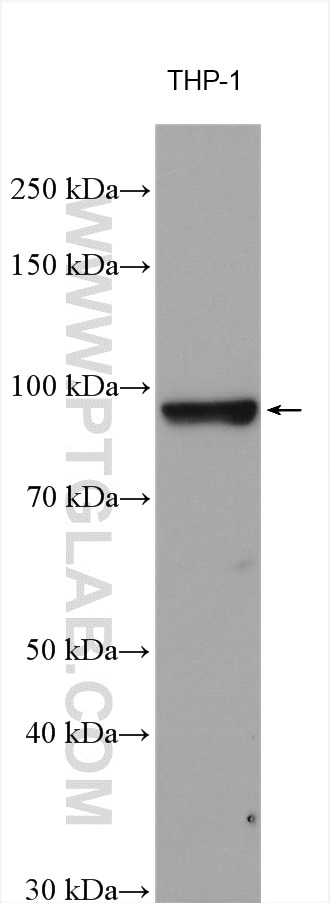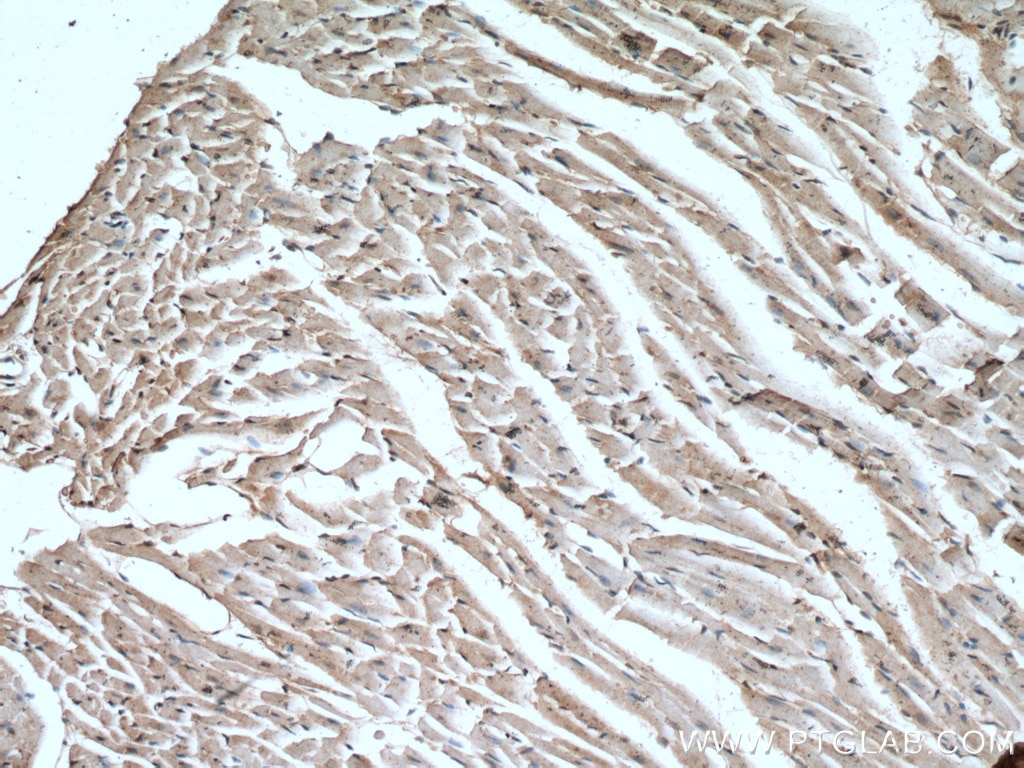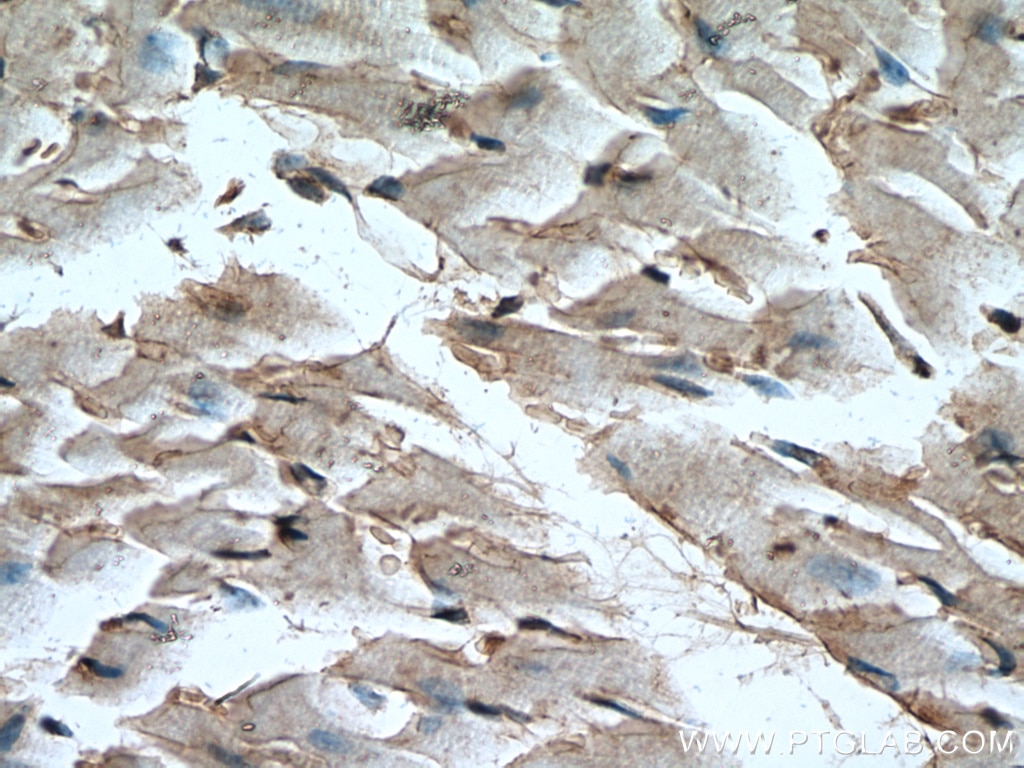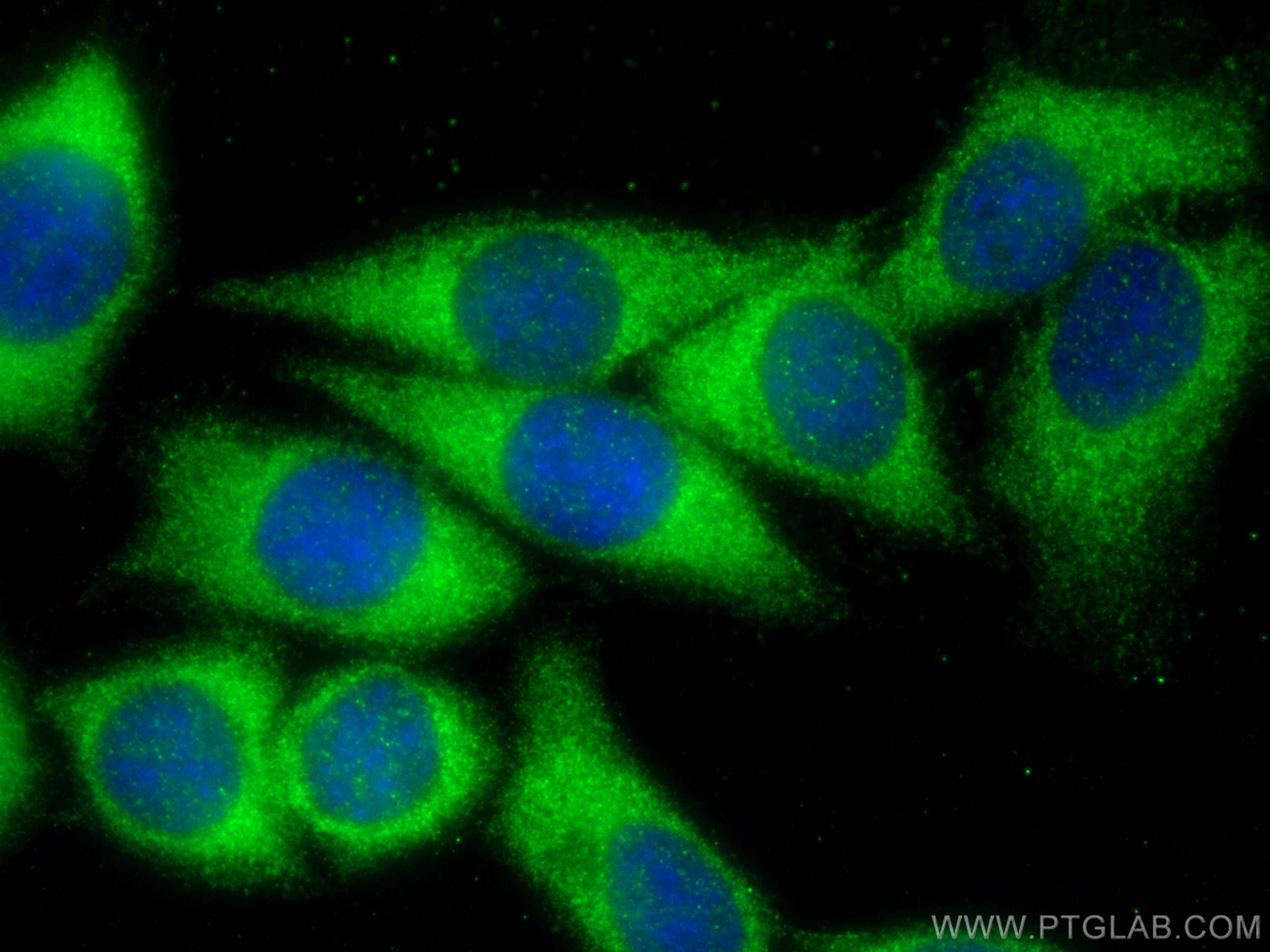LRRC8C Polyklonaler Antikörper
LRRC8C Polyklonal Antikörper für WB, IHC, IF/ICC, ELISA
Wirt / Isotyp
Kaninchen / IgG
Getestete Reaktivität
human, Maus, Ratte
Anwendung
WB, IHC, IF/ICC, ELISA
Konjugation
Unkonjugiert
Kat-Nr. : 21601-1-AP
Synonyme
Geprüfte Anwendungen
| Erfolgreiche Detektion in WB | THP-1-Zellen |
| Erfolgreiche Detektion in IHC | Mausherzgewebe Hinweis: Antigendemaskierung mit TE-Puffer pH 9,0 empfohlen. (*) Wahlweise kann die Antigendemaskierung auch mit Citratpuffer pH 6,0 erfolgen. |
| Erfolgreiche Detektion in IF/ICC | HepG2-Zellen |
Empfohlene Verdünnung
| Anwendung | Verdünnung |
|---|---|
| Western Blot (WB) | WB : 1:500-1:2000 |
| Immunhistochemie (IHC) | IHC : 1:50-1:500 |
| Immunfluoreszenz (IF)/ICC | IF/ICC : 1:50-1:500 |
| It is recommended that this reagent should be titrated in each testing system to obtain optimal results. | |
| Sample-dependent, check data in validation data gallery | |
Veröffentlichte Anwendungen
| WB | See 6 publications below |
| IF | See 2 publications below |
Produktinformation
21601-1-AP bindet in WB, IHC, IF/ICC, ELISA LRRC8C und zeigt Reaktivität mit human, Maus, Ratten
| Getestete Reaktivität | human, Maus, Ratte |
| In Publikationen genannte Reaktivität | human, Maus, Ratte |
| Wirt / Isotyp | Kaninchen / IgG |
| Klonalität | Polyklonal |
| Typ | Antikörper |
| Immunogen | LRRC8C fusion protein Ag16213 |
| Vollständiger Name | leucine rich repeat containing 8 family, member C |
| Berechnetes Molekulargewicht | 803 aa, 92 kDa |
| Beobachtetes Molekulargewicht | 92 kDa |
| GenBank-Zugangsnummer | BC113973 |
| Gene symbol | LRRC8C |
| Gene ID (NCBI) | 84230 |
| Konjugation | Unkonjugiert |
| Form | Liquid |
| Reinigungsmethode | Antigen-Affinitätsreinigung |
| Lagerungspuffer | PBS with 0.02% sodium azide and 50% glycerol |
| Lagerungsbedingungen | Bei -20°C lagern. Nach dem Versand ein Jahr lang stabil Aliquotieren ist bei -20oC Lagerung nicht notwendig. 20ul Größen enthalten 0,1% BSA. |
Hintergrundinformationen
LRRC8C (Leucine-rich repeat-containing protein 8C), also known as AD158, is a non-essential component of the volume-regulated anion channel (VRAC, also known as VSOAC channel), which is required to maintain a constant cell volume in response to extracellular or intracellular permeability changes. The VRAC channel conducts iodide better than chloride and can also conduct organic osmolytes like taurine. The VRAC channel also mediates transport of immunoreactive cyclic dinucleotide GMP-AMP (2'-3'-cGAMP), an immune messenger produced in response to DNA virus in the cytosol (PMID:24790029; 26824658; 28193731).
Protokolle
| PRODUKTSPEZIFISCHE PROTOKOLLE | |
|---|---|
| WB protocol for LRRC8C antibody 21601-1-AP | Protokoll herunterladen |
| IHC protocol for LRRC8C antibody 21601-1-AP | Protokoll herunterladenl |
| IF protocol for LRRC8C antibody 21601-1-AP | Protokoll herunterladen |
| STANDARD-PROTOKOLLE | |
|---|---|
| Klicken Sie hier, um unsere Standardprotokolle anzuzeigen |
Publikationen
| Species | Application | Title |
|---|---|---|
Nat Commun TET2-mediated tumor cGAS triggers endothelial STING activation to regulate vasculature remodeling and anti-tumor immunity in liver cancer | ||
Diabetes Metab J Single-Cell Landscape and a Macrophage Subset Enhancing Brown Adipocyte Function in Diabetes | ||
bioRxiv LRRC8 complexes are adenosine nucleotide release channels regulating platelet activation and arterial thrombosis | ||
bioRxiv Lysosomal LRRC8 complex regulates lysosomal pH, morphology and systemic glucose metabolism | ||
Sci Adv 2'3'-cGAMP interactome identifies 2'3'-cGAMP/Rab18/FosB signaling in cell migration control independent of innate immunity | ||
Sci Adv Regulation of volume-regulated anion channels alters sensitivity to platinum chemotherapy |
Rezensionen
The reviews below have been submitted by verified Proteintech customers who received an incentive for providing their feedback.
FH Joshua (Verified Customer) (08-16-2021) | This antibody was incubated at 4 degrees C O/N, in 5% Milk, and at a dilution ratio of 1:1,000. A secondary antibody at a dilution ratio of 1:5,000 was used. The acquired western blot image was achieved at an exposure time of 60 seconds. This product was vital in visualizing LRRC8c in both HUVECs and mouse lung tissue.
|





